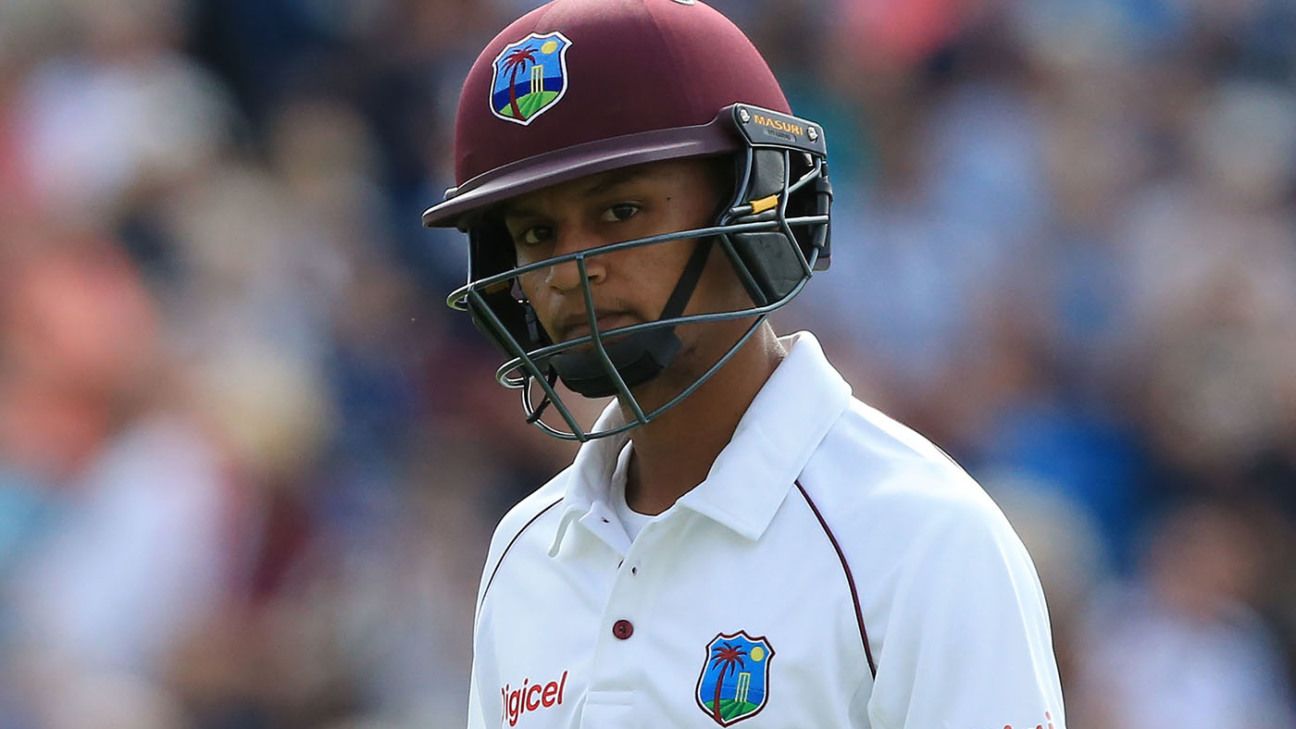
When West Indies last toured England in 2017, Shane Dowrich averaged 4.80. He struggled to adapt to the conditions, both with the bat and behind the stumps, and many onlookers surmised that Denesh Ramdin's return to the Test set-up could not come soon enough.
But since that tour, Dowrich has turned things around. He is now one of the first names on Jason Holder's team sheet, and can lay claim to being one of the best wicketkeeper-batsman in the world: since the start of 2018, no keeper has score more Test runs at a better average.
"I consider myself a different player to what I was three years ago," Dowrich said from Emirates Old Trafford, where West Indies have now been based for the best part of two weeks. "The last time I was here, it was very tough for me - it was a series that really changed around my career.
"I was young, I was in unfamiliar territory - to be honest, I really didn't cope well with it. Since then, I've been able to go away and I've learned a lot from my experience over here last time. Playing in England will always be a challenge, but I think I'm ready for it."
Along with Holder and Roston Chase, Dowrich has formed part of West Indies' engine room in the lower-middle order that has bailed out the top order's failings in the past two-and-a-half years. England know first-hand about the frustrations those three can pose, having seen Holder and Dowrich put on 295 in Barbados last year in a record partnership. They are the team's three leading run-scorers in that timeframe, and all three have found themselves marshalling the tail effectively.
"In terms of batting with bowlers, you have to trust them" Dowrich said. "You don't want them facing too many balls, but you still have to trust them in terms of when they do face the ball that they can get the job done.
"You have to give them that confidence that they can do it. That's how it can work well for you as the main batter in that situation."
With Darren Bravo and Shimron Hetmyer both absent from this squad, having opted not to travel to the UK, it is not impossible that Dowrich could find himself moving up the order to No. 6 in this series, depending on how West Indies decide to balance their side. While he played down that suggestion, saying he had "not really given it much thought", Dowrich admitted that he has set himself personal goals for the series.
"I'd like to leave England with a Test hundred, and I'm looking to average around 40 in this series," he said. "I would love to score a Test hundred in England: scoring runs is always a challenge, but I think if you're going to rate yourself as a player, you have to be able to do it. I think I've put in enough work to come away with something in the series."
As for the other part of his game, Dowrich has been working hard in training to adjust to the challenge posed by English conditions, in particular balls moving late after passing the bat. He has been pushed by Joshua da Silva, the back-up keeper for the series, and has been using a tape ball "almost every day" to help prepare him for late swing.
On West Indies' last visit, he spent some time working with James Foster, the former Essex wicketkeeper who now coaches around the world in T20 leagues, and hopes that his advice will stand him in good stead this time around.
"He was mostly into alignment, in terms of where I stood behind the stumps and getting the angles right," Dowrich said. "Most of our bowlers come from wide on the crease, so he was trying to get my positioning right behind the stumps so that I could line up the ball better.
"Also, [we worked on] staying low in my stance, so that when it swerves I'm in a strong position and not wobbly on my feet. Time spent in the middle has done a lot for me, and we just need a little bit more time out there to get accustomed to the conditions and… the pitches."
That time in the middle will come in the shape of a three-day warm-up match starting on Tuesday, the first of two that West Indies will play among themselves before the first Test. With the standard of invitational teams picked to play tourists generally low in recent years - most counties have fielded second-string XIs, and games have often been played with little intensity - Dowrich is hopeful that the intra-squad fixtures will provide useful preparation.
"I think it's an advantage, to be honest," he said. "The quality of our practice has been very high: every time you go into the nets, you're facing three or four quality fast bowlers. The games are going to be pretty competitive. Everyone is looking to do well and put their name out there in terms of getting into the team or staying in it."















 Phone: (800) 737. 6040
Phone: (800) 737. 6040 Fax: (800) 825 5558
Fax: (800) 825 5558 Website:
Website:  Email:
Email: 






